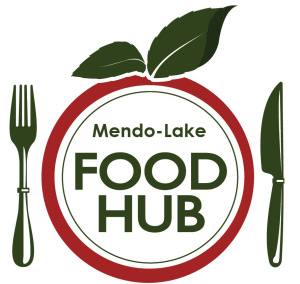By Karen Rifkin
The Mendo-Lake Food Hub, a grant-funded program initiated by North Coast Opportunities to connect local farmers with local retailers and restaurants in order to meet the growing demand for local food, is up and running.
Coordinator John Bailey, the man at the helm, explains that the program is funded by a two-year, nine-month grant from the California Department of Food and Agriculture (CDFA’s Specialty Crop Block Grant Program), developed and written by NCO employees Susan Lightfoot, Miles Gordon and Patty Bruder.
“It originated from the Farm to Fork grant to help create the connections and infrastructure for local foods to be used in food processing at local schools—to re-establish the knowledge and equipment to deliver fresh food.
“From this came the knowledge that a lot of farmers were struggling to get food to the market. The next step was to establish these connections and a base to create a system that can work and keep on working,” he says.
Many local growers earn retail dollars at farmers markets but there are only so many people who go there, and most food that is eaten is not bought at a farmers market.
Bailey asks, “How do we help smaller local farmers get into places where most food is bought and consumed?”
Lake and Mendocino counties are spread out, with a small population base and a lot of small farms, some of which are hours away from food centers.
“We are talking about one- to five-acre farms, maybe 10,” he says.
Lightfoot created a database of information and researched other food hub models throughout the country. Many food hubs have sprung up over the past 15 years, and in the last five years many more have been developed to figure out how to revitalize local food systems.
A traditional food hub model is a vegetable distributor with a main warehouse, trucks and full time staff.
“You need a million dollars a year gross revenue to make that model work,” says Bailey.
In working out the puzzle pieces, individuals were interviewed and it was determined that barriers for suppliers were transportation and cold storage and for buyers they did not know who the farmers were or what they had for sale.
Bailey connected with Josh Cavender, a Mendocino coast producer who was already distributing produce on the coast that he purchased from wholesale markets down south.
They came to an agreement, per box, for Cavender to carry local produce from farmers in Fort Bragg to retailers in Willits and Ukiah on his regular trip south. From there the produce is delivered to retailers in smaller vehicles.
John Foster Trucking is in the process of creating the nodes, retrofitting 30-foot shipping containers complete with insulation, a roof, refrigeration and internal lights. The Kelseyville node is up and running; the Willits and Ukiah nodes will be in place next; and the Caspar node will be there in late July.
The nodes have two temperatures, one in the mid to high 30s for leafy greens and one a bit higher with temperatures in the mid to high 50s for watermelon, peppers and tomatoes.
Additionally, Gowan Orchards has offered to make part of its cold storage available if needed.
The website—www.mendolakefoodhub.com— a fully functional shopping cart, provides a sales platform for farmers to display their produce and for buyers to purchase by the case. It is open for buying clubs, restaurants and grocery stores.
“Our biggest goal is to support local food systems, our local farmers selling fruits, vegetables and nuts,” says Bailey.
Produce is available from conventional growers; no spray; Mendocino Renegade, a local certification that conforms to organic standards, certified by a committee of farmers with less paperwork at a lower cost; and fully certified USDA organic.
“Young people who get into farming do it for a few years, realize they cannot make a go of it and give up. I operated a row crop farm in Potter Valley for four years; it was very hard to sell my produce wholesale and the farmers market did not bring in enough money. I didn’t see a future in it. This kind of system can make it viable. Farmers can make retail dollars at the farmers market and sell wholesale without having to drive everywhere.
“Independent farmers are the bedrock of American democracy and tradition. We have to have those independent voices that know what it takes to make a living off the land and supply food to people. Without that kind of link to the land and our tradition, we risk losing something valuable for our culture. The healthy food is part of it but there is a deeper cultural importance to independent farming,” he says.
Local farmers participating include: Lovin’ Mama, Covelo Organic, Irene’s Garden, Sky Hoyt, Fortunate Farm, Black Dog, Seely’s Farm Stand, and more are being added every week.
Buyers so far include Harvest Market in Fort Bragg and Mendocino, Ukiah Co-op, Taste Buds, Saucy, and Patrona. In addition, Lake County Public Health is purchasing through the Hub for its Harvest of the Month program. The number of producers and buyers is expected to climb in the coming weeks.



